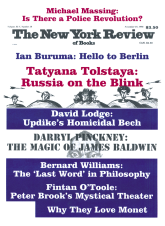First
First, a fringe of the aristocracy cultivating literature and art, elegant, freed from the coarser superstitions. And churches filled with the pious, the scent of their incense and their prayers. They would come to a common frame of mind. It would take a hundred and fifty years.
Opium for the People
Religion, opium for the people. To those suffering pain, humiliation, illness, and serfdom, it promised a reward in an afterlife. And now we are witnessing a transformation. A true opium for the people is a belief in nothingness after death—the huge solace of thinking that for our betrayals, greed, cowardice, murders we are not going to be judged.
Religion and Politics
It is understandable that there are those who prefer nothing to religion, especially with nationalistic baggage (Bosnia, Northern Ireland). There is ample experience to show that men envelop themselves in sublime goals, purity, and the nobility of a highfalutin spiritual domain, in order to pretend they don’t know what their hands are doing.
Religions
All great religions—Christianity, Buddhism, Judaism, Islam—have a vision of man as judged after death, with a visible predilection for the image of a contention between the Accuser and the Defender. Sometimes there is a scale to weigh sins and good deeds. In Tibetan Buddhism the judge is the Master of Death and in coming to his verdict he is assisted by pebbles, black ones cast on a balance by the Accuser, white ones cast by the Defender. All religions recognize that our deeds are imperishable; in Buddhism this is called karma.
After It Had Been Fulfilled
A prophet, as he called himself, of European nihilism, Nietzsche used to say with pride “we, nihilists” and defined what would be the “most blatant form of nihilism.” It would be “a view according to which any belief, any conviction would be by necessity false, simply because there is no true world.” He called this “a godlike way of thinking.” For his master and teacher Schopenhauer, he had an epithet: “decadent.”
He would probably not be very happy with the use made of his oeuvre during the hundred years since his death. After all, what he valued was courage. And today courage is required to dissent from his views.
Poor Schopenhauer
Why should he be the philosopher whose name appears any time a pedigree needs to be produced for European nihilism? He doesn’t deserve it. If for no other reason, for the place his philosophy assigned to saintliness and art.
To the extent that he was influenced by Asian religion, liberation meant for him throwing off the burden of karma. Only in coffeehouse folklore is Nirvana identified with nothingness. According to Schopenhauer, Nirvana could not be expressed in the language of Samsara, of the illusory world: it implied just the opposite.
VerticalAxis
Up and down. One may wonder at the image of Ascension in the New Testament, but the vertical axis rules everywhere in the noncorporeal world. Thus the subterranean Hades of the Greeks and Sheol of the Jews. In Dante, Hell is below, Purgatory somehow higher, Paradise above; in the Tibetan Book of the Dead, Bardo, the intermediary state after death, allows for a movement up to better incarnations, or down to inferior incarnations.
Prediction Vladimir Solovev in his work Three Conversations,
1900, tells about a sect of hole worshipers in Russia. They would bore a hole in the wall of a hut and would pray to it: “O holy hole!”
A Quotation
(From Lot’s Escape by Aleksander Wat)
“Balzac, Stendhal, generations of novelists who uncovered the piteous backstage of human motives and actions, who ferreted out every proof of the degradation of human nature, down to the very bottom of man’s dreams”—meditated Lot, the central character in Wat’s novel, and grew scared. He was endowed with an innate admiration for everything well executed, well written, of a proper caliber—and he felt even greater fear when he realized that no one was, any longer, concerned with “what,” only with “how,” that we have become indifferent to content and react, not even to form, but to technique, to technical efficiency itself.
—Translated by Robert Hass and the author
This Issue
November 19, 1998



